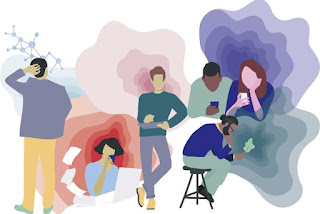Navigating the Maze: Understanding Anxiety Disorders and Coping Strategies
As we navigate through the complexities of life, we often encounter challenges that can trigger feelings of anxiety. While it is normal to experience occasional bouts of anxiety, for some individuals, it can become a debilitating disorder that significantly impacts their daily lives. According to the World Health Organization, an estimated 275 million people worldwide suffer from anxiety disorders, making it the most prevalent mental health condition globally.
In Bhopal, a city in central India,
the prevalence of anxiety disorders is no different. As a psychiatrist in Bhopal, I have seen firsthand
the impact of anxiety on individuals and their loved ones. In this blog post, I
aim to shed light on anxiety disorders, their symptoms, and coping strategies.
Understanding
Anxiety Disorders:
Anxiety disorders are a group of
mental health conditions characterized by persistent and excessive worry, fear,
and apprehension. These feelings are often intense, overwhelming, and can
interfere with daily activities and relationships. There are several types of
anxiety disorders, including generalized anxiety disorder, panic disorder,
social anxiety disorder, and phobias.
Symptoms of anxiety disorders can
vary from person to person, but some common signs include excessive worry,
restlessness, difficulty concentrating, irritability, muscle tension, and
difficulty sleeping. These symptoms may also manifest physically, such as
headaches, stomachaches, and fatigue.
Coping
Strategies for Anxiety Disorders:
If you or someone you know is
struggling with anxiety, it is essential to seek help from a mental health
professional, such as a psychiatrist in Bhopal. They can provide a proper
diagnosis and create a personalized treatment plan. Along with therapy and
medication, here are some coping strategies that can help manage anxiety
disorders:
1) Practice
relaxation techniques: Deep breathing, meditation, and yoga are effective
techniques to calm the mind and reduce anxiety.
2) Exercise
regularly:
Physical activity releases endorphins, which can improve mood and reduce stress
and anxiety.
3) Maintain
a healthy lifestyle: Eating a well-balanced diet, getting enough sleep, and
avoiding alcohol and drugs can help manage anxiety.
4) Identify
triggers:
It is essential to identify the situations or thoughts that trigger anxiety and
find ways to manage or avoid them.
Also Read: Sleep Disorder Treatment in
Bhopal



Comments
Post a Comment